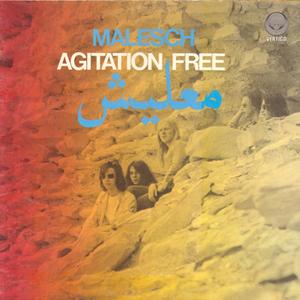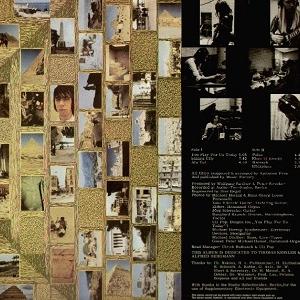Malesch


Artist:
Agitation Free
Label:
Vertigo
Catalog#:
6360 607
Format:
Vinyl
Country:
Germany
Released:
1972-06
| Tracklist | |||
| A1 | You Play For Us Today | 6:08 | |
| A2 | Sahara City | 7:42 | |
| A3 | Ala Tul | 4:50 | |
| B1 | Pulse | 4:43 | |
| B2 | Khan El Khalili | 5:30 | |
| B3 | Malesch | 8:10 | |
| B4 | Rücksturz | 2:09 | |
Credits
Bass, Tape [Live Tapes] - Michael Günther
Bongos - Uli Pop
Drums, Marimba, Vocals - Burghard Rausch
Guitar - Jörg Schwenke
Guitar, Zither, Organ - Lutz Ulbrich
Organ [Hammond] - Peter Michael Hamel
Photography By - Hans Georg Losse
Producer - Peter Strecker
Producer - Wolfgang Sandner
Synthesizer, Steel Guitar, Photography - Michael Hoenig
Written-By - Agitation Free
Notes
Released on a swirl Vertigo label in a fold-out cover.
Strawberry Bricks Entry:
Agitation Free's roots were in the same creative scene that most bands in late-60s Berlin shared. The group was founded in 1967 by bassist Michael Günther and guitarist Lutz "Lüül" Ulbrich. By the time their ranks had congealed enough to record their debut album, drummer Christopher Franke had already departed to Tangerine Dream, and guitarist Ax Genrich to Guru Guru. By 1971, keyboardist Michael Hoenig, guitarist Jörg Schwenke and drummer Burghard Rausch had joined Günther and Ulbrich, and teamed up with avant-garde composer Thomas Kessler and his Berlin studio. Improvisation and experimentation were at the band's core; and fortunately, so was endurance. Using a grant from the Goethe Institute, the band traveled to Egypt, Lebanon and Cyprus. Upon returning to Berlin, Agitation Free recorded their debut album, Malesch, for the Music Factory label in 1972. "You Play for Us Today" opens with a soundbite from their trip, one of the many field recordings interspersed throughout the record; while "Sahara City" drifts in stasis until it erupts, "Ala Tul" offers a progressive sound, anchored by organ and punctuated by a gripping rhythm from Rausch and guest Uli Popp. "Pulse" rises from a simple pulsating synth, just as the title track "Malesch" emerges from an organ line. Much like music from the Middle East, the band builds on a pattern, propelled forward by a fluid, moving rhythm. As avant-garde or even academic as their roots may be, there's still a musicality to the band that defies that pedigree. Like the best American psychedelic bands, Agitation Free excel at improvisation, and offer a free rock sound that's both stirring and moving. The closing "Ruecksturz" reprises a melodious theme, indicating the direction for their next album. ["Malesch" is an Egyptian word that translates to "take it easy, don't worry"—a response to their first concert's cancellation due to a customs delay entering Egypt.]

